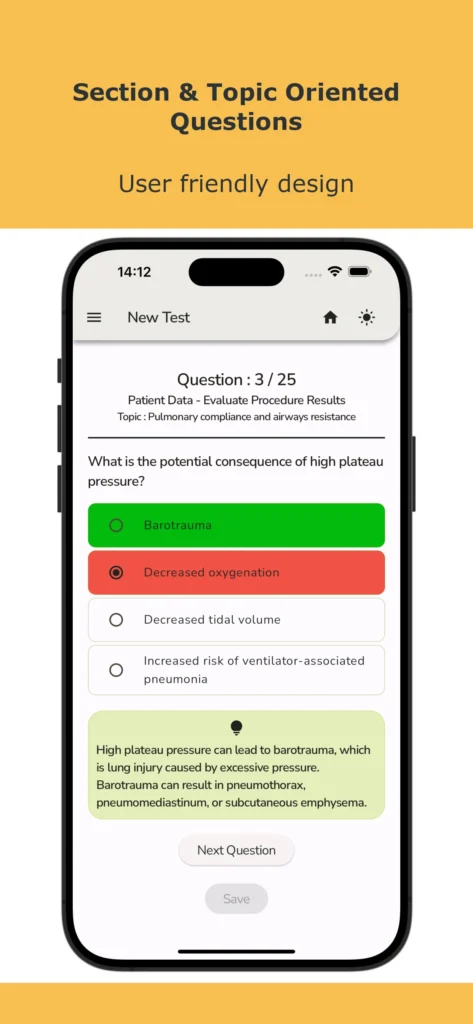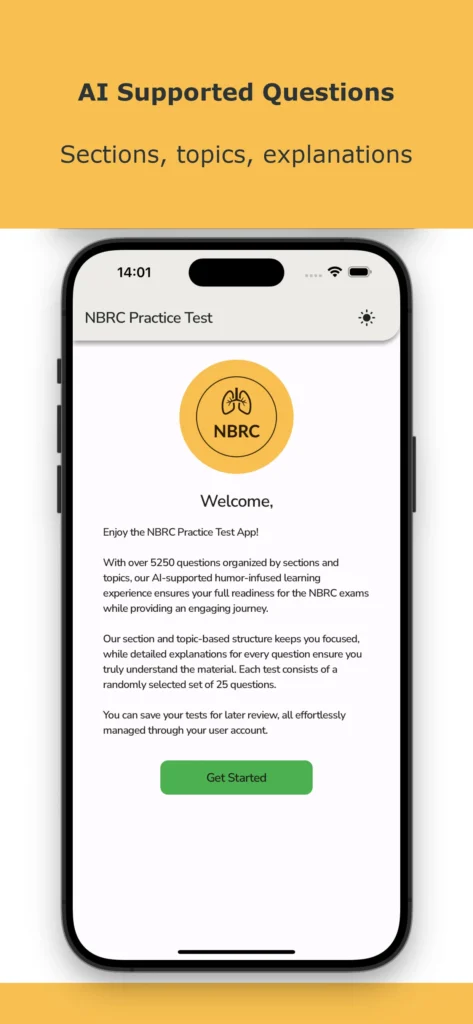Introduction to NBRC
What is NBRC?
The National Board for Respiratory Care (NBRC) is a non-profit organization that provides certification and credentialing for respiratory therapists in the United States. It is the leading organization in the field, dedicated to ensuring the highest standards of respiratory care.
The NBRC offers a range of credentials and exams that respiratory therapists can pursue to demonstrate their knowledge and expertise in the field. These credentials are widely recognized and respected by employers, healthcare organizations, and regulatory bodies.
What are the Three NBRC Specialty Credentials?
The NBRC offers three specialty credentials for respiratory therapists:
- Registered Respiratory Therapist (RRT)
- Certified Respiratory Therapist (CRT)
- Neonatal/Pediatric Respiratory Care Specialist (NPS)
The RRT credential is the highest level of certification offered by the NBRC and is considered the standard for respiratory therapists. The CRT credential is an entry-level certification, while the NPS credential is specific to respiratory therapists who specialize in neonatal and pediatric care.
What is the Passing Score for NBRC RRT Exam?
The passing score for the NBRC RRT exam is determined by the NBRC and may vary from year to year. It is important for aspiring respiratory therapists to prepare thoroughly for the exam to increase their chances of achieving a passing score. The exam assesses the candidate’s knowledge and skills in various areas of respiratory care.
What is NBRC Certification?
NBRC certification is a validation of a respiratory therapist’s competence and expertise in the field. It demonstrates that the individual has met the rigorous standards set by the NBRC and has successfully passed the required exams. NBRC certification is highly regarded and is often a requirement for employment in the field of respiratory care.
What is the NBRC High Cut Score 2022?
The NBRC high cut score for 2022 has not been announced yet. The high cut score is the minimum score required to pass the NBRC exams. It is set based on the difficulty level of the exam and the performance of the candidates. The NBRC regularly reviews and updates the cut scores to ensure they reflect the current standards of respiratory care.
How Many CEUs is PALS for NBRC?
The number of Continuing Education Units (CEUs) required for Pediatric Advanced Life Support (PALS) certification may vary depending on the specific requirements of the NBRC and the state in which the respiratory therapist is practicing. It is important for respiratory therapists to stay updated on the CEU requirements and ensure they fulfill them to maintain their certification.
How Many CEUs is ACLS for NBRC?
Similar to PALS, the number of CEUs required for Advanced Cardiovascular Life Support (ACLS) certification may vary. Respiratory therapists should consult the NBRC and their state licensing board for the specific CEU requirements for ACLS certification.
NBRC Credentials and Exams
What is NBRC?
The National Board for Respiratory Care (NBRC) is a non-profit organization that provides certification and credentialing for respiratory therapists in the United States. It is the leading organization in the field and sets the standards for respiratory care practice.
What are the Three NBRC Specialty Credentials?
The NBRC offers three specialty credentials for respiratory therapists:
- Registered Respiratory Therapist (RRT)
- Certified Respiratory Therapist (CRT)
- Neonatal/Pediatric Respiratory Care Specialist (NPS)
Each credential has its own requirements and exams.
What is the Passing Score for NBRC RRT Exam?
The passing score for the NBRC RRT (Registered Respiratory Therapist) exam is determined by the NBRC. It is based on a scaled scoring system and may vary from year to year. To pass the exam, candidates must achieve a score above the passing threshold set by the NBRC.
What is NBRC Certification?
NBRC certification is a recognition of a respiratory therapist’s competence and expertise in the field. It demonstrates that the therapist has met the rigorous standards set by the NBRC and has successfully passed the required exams.
What is the NBRC High Cut Score 2022?
The NBRC high cut score for 2022 has not been announced yet. The high cut score is the highest score achieved by a candidate on the NBRC exam. It serves as a benchmark for evaluating the performance of other candidates.
How Many CEUs is PALS for NBRC?
The number of Continuing Education Units (CEUs) required for Pediatric Advanced Life Support (PALS) certification may vary depending on the state and the specific requirements of the NBRC. It is recommended to check with the NBRC or the state licensing board for the most up-to-date information.
How Many CEUs is ACLS for NBRC?
The number of Continuing Education Units (CEUs) required for Advanced Cardiovascular Life Support (ACLS) certification may vary depending on the state and the specific requirements of the NBRC. It is recommended to check with the NBRC or the state licensing board for the most up-to-date information.
The Importance of RRT Credential
What is the RRT Credential?
The Registered Respiratory Therapist (RRT) credential is a professional certification offered by the National Board for Respiratory Care (NBRC). It is the highest level of certification for respiratory therapists and signifies a high level of expertise and competency in the field.
Why is the RRT Credential Important?
The RRT credential is important for several reasons:
- Recognition of Expertise: The RRT credential demonstrates that a respiratory therapist has met the rigorous standards set by the NBRC and has the knowledge and skills necessary to provide high-quality care to patients.
- Employment Opportunities: Many healthcare facilities require respiratory therapists to hold the RRT credential. Having this credential can open up a wide range of job opportunities and increase your chances of landing a desirable position.
- Higher Earning Potential: Respiratory therapists with the RRT credential often earn higher salaries compared to those without it. This is because the credential signifies a higher level of expertise and experience.
How to Obtain the RRT Credential?
To obtain the RRT credential, respiratory therapists must first pass the Therapist Multiple-Choice (TMC) Exam, which tests their knowledge and understanding of respiratory therapy principles and practices. After passing the TMC Exam, therapists must then pass the Clinical Simulation Exam (CSE), which assesses their ability to apply their knowledge and skills in simulated patient care scenarios.
Continuing Education Requirements
Once respiratory therapists obtain the RRT credential, they must maintain it by fulfilling continuing education requirements. The NBRC requires RRTs to earn a certain number of Continuing Education Units (CEUs) within a specified timeframe. These CEUs can be earned through various educational activities, such as attending conferences, completing online courses, or participating in research projects.
Conclusion
The RRT credential is a valuable certification for respiratory therapists, demonstrating their expertise and opening up opportunities for career advancement. By obtaining and maintaining this credential, respiratory therapists can enhance their professional reputation, increase their earning potential, and provide the highest level of care to their patients.
Passing Score for NBRC RRT Exam
What is the Passing Score for NBRC RRT Exam?
The National Board for Respiratory Care (NBRC) is responsible for administering the Registered Respiratory Therapist (RRT) exam, which is a crucial step for respiratory therapists seeking certification. To pass the NBRC RRT exam, candidates must achieve a minimum passing score determined by the NBRC.
The passing score for the NBRC RRT exam is determined through a standardized process that takes into account the difficulty level of the exam questions and the performance of a representative sample of respiratory therapists who have taken the exam. The NBRC uses statistical analysis to establish a passing score that ensures candidates possess the necessary knowledge and skills to practice as a competent respiratory therapist.
It’s important to note that the passing score for the NBRC RRT exam may vary from year to year, as the NBRC periodically reviews and updates the passing standards to align with current practice guidelines and industry standards. Therefore, it is essential for candidates to stay updated on the latest passing score requirements.
What is NBRC Certification?
NBRC certification is a nationally recognized credential that validates the competency and expertise of respiratory therapists. The NBRC offers three specialty credentials:
- Registered Respiratory Therapist (RRT)
- Certified Respiratory Therapist (CRT)
- Neonatal/Pediatric Respiratory Care Specialist (NPS)
Each credential has its own set of requirements and exams. The RRT credential is considered the highest level of certification and is widely recognized as the standard for respiratory therapists.
What is the NBRC High Cut Score 2022?
The NBRC periodically reviews and updates the passing standards for its exams, including the RRT exam. In 2022, the NBRC introduced a new concept called the High Cut Score. The High Cut Score is an additional performance standard that recognizes candidates who demonstrate exceptional knowledge and skills in respiratory therapy.
The NBRC High Cut Score is set above the passing score and serves as a benchmark for excellence in the field. Candidates who achieve the High Cut Score receive a special designation on their certification, highlighting their exceptional performance.
How Many CEUs is PALS for NBRC?
The Pediatric Advanced Life Support (PALS) certification is an important qualification for respiratory therapists working with pediatric patients. The number of Continuing Education Units (CEUs) required for PALS may vary depending on the specific requirements set by the NBRC and other regulatory bodies.
It is recommended that respiratory therapists consult the NBRC website or contact the NBRC directly to obtain the most accurate and up-to-date information regarding the number of CEUs required for PALS certification.
How Many CEUs is ACLS for NBRC?
The Advanced Cardiovascular Life Support (ACLS) certification is another valuable qualification for respiratory therapists. Similar to PALS, the number of CEUs required for ACLS may vary based on the NBRC’s requirements and other regulatory guidelines.
Respiratory therapists should refer to the NBRC website or reach out to the NBRC for the latest information on the number of CEUs needed for ACLS certification.
Continuing Education for NBRC
What is NBRC?
The National Board for Respiratory Care (NBRC) is a credentialing organization that sets standards and administers examinations for respiratory therapists in the United States. It is responsible for ensuring that respiratory therapists meet the necessary qualifications and competencies to provide quality care to patients.
The NBRC offers three specialty credentials for respiratory therapists:
- Registered Respiratory Therapist (RRT)
- Certified Respiratory Therapist (CRT)
- Neonatal/Pediatric Respiratory Care Specialist (NPS)
These credentials are recognized and respected in the field of respiratory care, and they demonstrate a respiratory therapist’s expertise and commitment to professional development.
Continuing Education Requirements
In order to maintain their NBRC credentials, respiratory therapists are required to participate in continuing education activities. Continuing education helps respiratory therapists stay up-to-date with the latest advancements in the field and ensures that they provide the best possible care to their patients.
The NBRC requires respiratory therapists to earn a certain number of Continuing Education Units (CEUs) within a specified time period. The exact requirements vary depending on the credential held:
- RRT: 30 CEUs every five years
- CRT: 20 CEUs every five years
- NPS: 15 CEUs every five years
Respiratory therapists can earn CEUs by attending conferences, workshops, seminars, and online courses that are approved by the NBRC. They can also earn CEUs by participating in research projects, publishing articles, or presenting at professional conferences.
Importance of Continuing Education
Continuing education is crucial for respiratory therapists to stay current with the latest research, technologies, and best practices in the field. It allows them to enhance their knowledge and skills, which ultimately benefits their patients.
By participating in continuing education activities, respiratory therapists can:
- Stay updated on advancements in respiratory care
- Improve their clinical skills and decision-making abilities
- Expand their knowledge in specialized areas of respiratory care
- Enhance their career prospects and professional growth
Continuing education also plays a vital role in maintaining the credibility and professionalism of the respiratory therapy profession. It ensures that respiratory therapists adhere to the highest standards of practice and provide quality care to their patients.
Meeting Continuing Education Requirements
Respiratory therapists have a variety of options to meet their continuing education requirements. They can choose from a wide range of educational activities that are relevant to their practice and interests.
Some common ways to earn CEUs include:
- Attending conferences and workshops
- Completing online courses and webinars
- Participating in research projects
- Presenting at professional conferences
- Reading and reviewing scientific articles
It is important for respiratory therapists to keep track of their CEUs and ensure that they meet the requirements set by the NBRC. Failure to meet the continuing education requirements may result in the loss of their credential.
Conclusion
Continuing education is an essential component of maintaining NBRC credentials for respiratory therapists. It allows them to stay updated with the latest advancements in the field and provide the best possible care to their patients. By participating in continuing education activities, respiratory therapists can enhance their knowledge, skills, and career prospects, while upholding the highest standards of practice in respiratory care.
Conclusion
In conclusion, the National Board for Respiratory Care (NBRC) plays a crucial role in ensuring the competency and professionalism of respiratory therapists. Through its rigorous exams and high standards, the NBRC certifies respiratory therapists and grants them the necessary credentials to practice in the field.
The NBRC offers three specialty credentials: the Certified Respiratory Therapist (CRT), the Registered Respiratory Therapist (RRT), and the Sleep Disorders Testing and Therapeutic Intervention Specialist (SDS). Each credential represents a different level of expertise and specialization within the field of respiratory care.
To obtain the CRT credential, candidates must pass the Therapist Multiple-Choice (TMC) Exam. This exam assesses the candidate’s knowledge and skills in various areas of respiratory care. The passing score for the TMC Exam is determined by the NBRC and may vary from year to year.
For those aspiring to become Registered Respiratory Therapists (RRTs), they must first obtain the CRT credential and then pass the Clinical Simulation Exam (CSE). The CSE evaluates the candidate’s ability to apply their knowledge and skills in realistic patient scenarios. The passing score for the CSE is also determined by the NBRC.
The SDS credential is available for respiratory therapists who specialize in sleep disorders testing and therapeutic intervention. To obtain this credential, candidates must pass the Sleep Disorders Specialty (SDS) Exam, which assesses their knowledge and skills in this specific area.
It is important for respiratory therapists to maintain their credentials by fulfilling continuing education requirements. The NBRC requires respiratory therapists to earn a certain number of Continuing Education Units (CEUs) to maintain their certification. The exact number of CEUs required may vary depending on the specific credential and any changes in NBRC policies.
In 2022, the NBRC has implemented a high cut score for the RRT exam. This means that candidates must achieve a higher score to pass the exam and obtain the RRT credential. The high cut score is set to ensure that only highly competent and knowledgeable respiratory therapists are granted the RRT credential.
For those who are interested in pursuing advanced certifications such as Pediatric Advanced Life Support (PALS) or Advanced Cardiovascular Life Support (ACLS), these courses can provide valuable knowledge and skills. However, it is important to note that the NBRC does not directly offer these certifications. Instead, they may recognize these certifications as part of the continuing education requirements.
Overall, the NBRC is dedicated to upholding the highest standards in respiratory care and ensuring that respiratory therapists possess the necessary knowledge and skills to provide quality patient care. By obtaining NBRC credentials and maintaining their certification through continuing education, respiratory therapists demonstrate their commitment to professional growth and excellence in their field.








